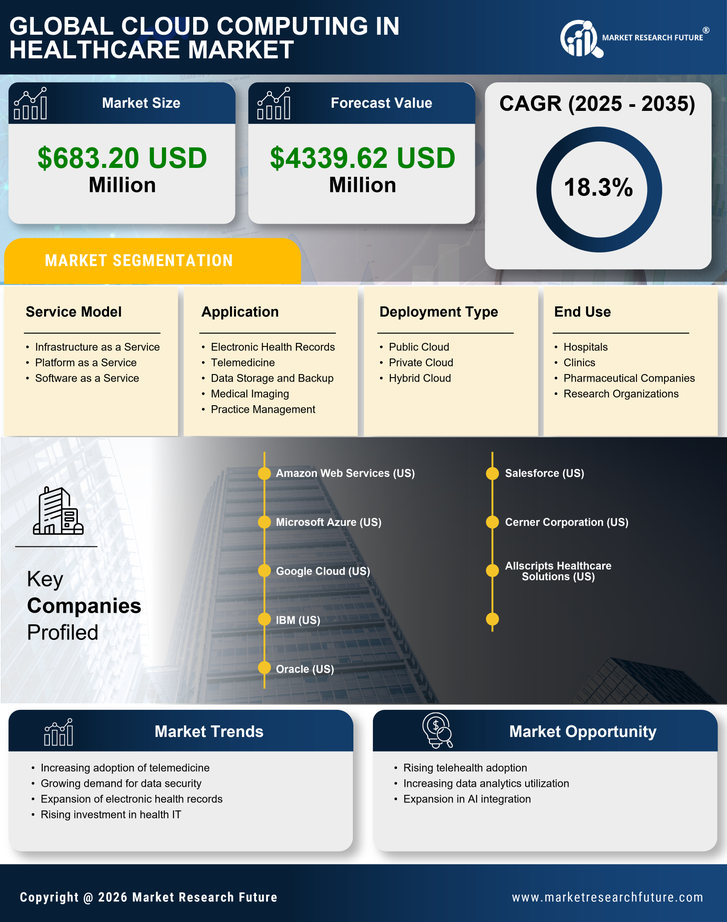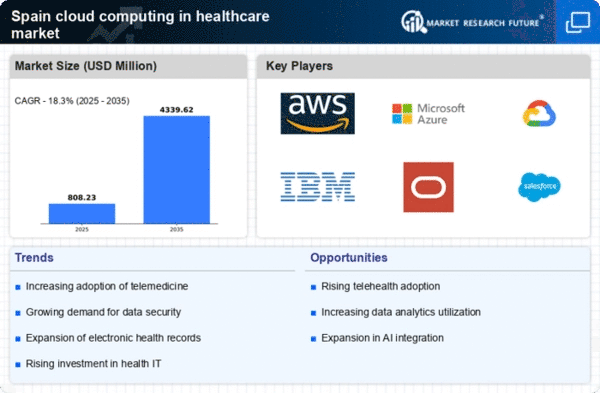Rising Focus on Data Interoperability
Data interoperability is becoming a critical driver in the cloud computing-in-healthcare market. In Spain, healthcare providers are increasingly recognizing the need for seamless data exchange among various systems and platforms. This focus on interoperability is essential for improving patient outcomes and streamlining healthcare processes. According to industry reports, around 70% of healthcare organizations in Spain are prioritizing interoperability initiatives to enhance care coordination. Cloud-based solutions offer the necessary infrastructure to facilitate this data sharing, allowing for better collaboration among healthcare professionals. As a result, the cloud computing-in-healthcare market is likely to witness substantial growth, with estimates suggesting a market size increase of €1 billion by 2027.
Cost Efficiency and Resource Optimization
Cost efficiency is a significant driver for the cloud computing-in-healthcare market in Spain. Healthcare organizations are increasingly seeking ways to reduce operational costs while maintaining high-quality care. Cloud computing offers a scalable and flexible solution that allows institutions to optimize their resources effectively. By migrating to cloud-based systems, healthcare providers can minimize the need for extensive on-premises infrastructure, leading to substantial savings. Reports indicate that organizations can reduce IT costs by up to 30% through cloud adoption. This financial incentive is compelling for many healthcare entities, prompting them to invest in cloud solutions. Consequently, the cloud computing-in-healthcare market is expected to grow as more organizations recognize the potential for cost savings and improved operational efficiency.
Growing Demand for Remote Patient Monitoring
The cloud computing-in-healthcare market is experiencing a notable surge in demand for remote patient monitoring solutions. This trend is driven by the increasing prevalence of chronic diseases in Spain, which necessitates continuous health monitoring. According to recent data, approximately 30% of the Spanish population suffers from chronic conditions, leading healthcare providers to seek efficient ways to manage patient care remotely. Cloud-based platforms facilitate real-time data collection and analysis, enabling healthcare professionals to make informed decisions. Furthermore, the integration of these solutions into existing healthcare systems enhances patient engagement and satisfaction. As a result, the cloud computing-in-healthcare market is likely to expand significantly, with projections indicating a growth rate of around 15% annually over the next five years.
Regulatory Support for Digital Health Initiatives
The cloud computing-in-healthcare market benefits from robust regulatory support for digital health initiatives in Spain. The government has implemented various policies aimed at promoting the adoption of digital technologies in healthcare. For instance, the Spanish Ministry of Health has introduced frameworks that encourage the use of cloud-based solutions to improve healthcare delivery. This regulatory environment fosters innovation and investment in the cloud computing-in-healthcare market, as stakeholders are more inclined to adopt technologies that align with government objectives. Additionally, the European Union's Digital Health Strategy further reinforces this trend, providing funding and resources to enhance digital health infrastructure. Consequently, the cloud computing-in-healthcare market is poised for growth, with an expected increase in investment from both public and private sectors.
Enhanced Patient Engagement through Cloud Solutions
The cloud computing-in-healthcare market is increasingly driven by the need for enhanced patient engagement. In Spain, healthcare providers are leveraging cloud-based platforms to improve communication and interaction with patients. These solutions enable the development of patient portals and mobile applications that facilitate access to health information, appointment scheduling, and telehealth services. Research indicates that patient engagement initiatives can lead to a 20% increase in treatment adherence, which is crucial for improving health outcomes. As healthcare organizations prioritize patient-centered care, the demand for cloud-based engagement tools is likely to rise. This trend suggests a promising future for the cloud computing-in-healthcare market, with expectations of continued growth as providers seek to foster stronger relationships with their patients.

















